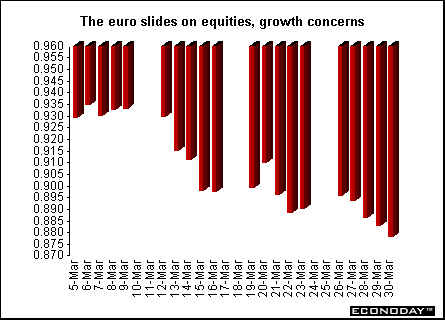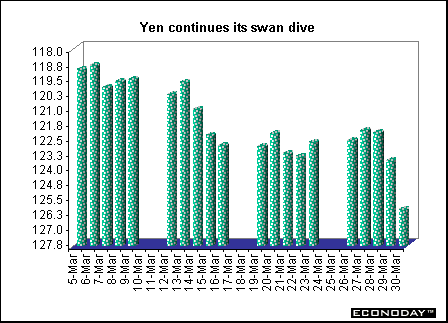
Currencies
The currency markets registered their disappointment with the ECB when it did not lower its interest rate by rapidly selling the euro immediately after the ECB's announcement. The currency has been sinking because the markets have concluded that Europe is vulnerable to the downturn in the United States and Japan, despite denial by many officials. The euro is hovering only marginally above the 87.50 cent level that prompted the world's major central banks to support it last September with concerted intervention. The euro dropped below 88 cents for the first time since mid-December. Traders unequivocally believe that the central bank has made a mistake by not lowering rates, and investors are losing confidence in the ECB.

The dollar has remained strong in the first quarter despite signs of an economic slowdown. Some analysts are attributing the dollar's success to flows going to U.S. bonds amid volatility in stock markets, while others say the Fed's sharp response to U.S. weakness is creating optimism about the U.S. growth outlook. The United States is being the most aggressive in dealing with the problems its economy faces.
On Friday, the yen plunged to a 2 1/2 year low against the dollar after investors interpreted comments by Economic and Fiscal Policy Minister Taro Aso as suggesting the United States favors a weaker yen. The remarks were interpreted as another official attempt to weaken the yen. A weaker yen would help lure overseas buyers to Japanese exports, spurring growth. Japan is on the brink of economic contraction, growing 0.8 percent in the fourth quarter after contracting 0.6 percent in the previous three months. Japanese exporters benefit from the yen's decline against the dollar and euro. The cheaper currency bolsters the value of their foreign based revenue when converted to yen.

Economic reports also helped weaken the yen. March Tokyo consumer prices fell for a second straight month, suggesting no end to the nation's two year bout of deflation. (See indicator scoreboard below.) The Bank of Japan's quarterly Tankan survey of business sentiment, due Monday, is expected to show more business executives growing pessimistic about the economy. The Tankan is very closely watched by the financial markets.


Introduction • Global Stock Market Indexes • Recap of Global Markets • Currencies • Indicator Scoreboard

The Bottom Line • Looking Ahead
|